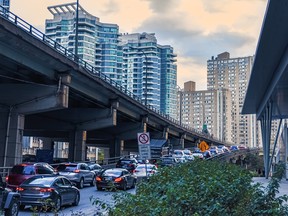The research suggests that using a car for more than half of all activities can result in lower life satisfaction

- A recent U.S. study links excessive car dependency to being less satisfied with life
- The tipping point appears to be driving for 50% or more of all out-of-home activities
- Better transit, walking, and cycling infrastructure could potentially improve happiness
That suggests that “planners and decision-makers should promote multimodality and land-use patterns that may help to reduce car dependence and its potential negative effect on subjective well-being,” the researchers concluded.
That could include expanded and improved public transit, and city and urban planning that makes it easier for people to walk or cycle to their destinations — or, as the researchers put it, “beyond transportation’s utilitarian function, the way individuals move around to access goods, services, and social networks may have implications for well-being, leading to higher or lower levels of life satisfaction.”
The research found that about 92% of American households have access to at least one vehicle, and 87% of Americans use their cars each day. Some 69% of commuters drive to work, while only 3% use public transit to get there. There are some 290 million vehicles making their way along streets and highways in the U.S. In addition to driving, the researchers also factored in such life-satisfaction variables as income, family situations, race, and disability to come to their conclusions.
The researchers noted that the majority of Americans prefer driving for reasons such as convenience, flexibility, comfort, and access; and that some of these benefits are “associated with enjoyable travel experiences and positive emotions.” But those benefits appear to tip over to the other side once that 50% threshold of car dependence is reached.

“Car dependency has a threshold effect,” said Rababe Saadaoui, lead author of the study. “Using a car just sometimes increases life satisfaction, but if you have to drive much more than this, people start reporting lower levels of happiness. Extreme car dependence comes at a cost, to the point that the downsides outweigh the benefits.”
Saadaoui, who is an urban planning expert at Arizona State University, said the negative effects could include the cost of owning and maintaining a vehicle, continually navigating roads and dealing with traffic, reduced engagement with others, and losing the physical benefits of walking. “The study doesn’t call for people to completely stop using cars, but the solution could be in finding a balance,” he said.
Sign up for our newsletter Blind-Spot Monitor and follow our social channels on X, Tiktok and LinkedIn to stay up to date on the latest automotive news, reviews, car culture, and vehicle shopping advice.